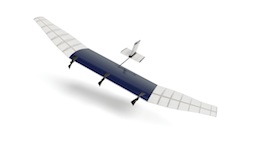Facebook is eyeing free space optical technology, low orbit satellites and solar powered drones to try and connect people in developing countries to the internet.
The social network has launched a Connectivity Lab, which is working on new technology for its Internet.org project. Among the companies involved is UK-based Ascenta, which specialises in the design and building of high-altitude, long-endurance aircraft. Other team members include former staff from NASA’s Jet Propulsion Laboratory, NASA’s Ames Research Center, and the National Optical Astronomy Observatory.
Yael Maguire, who is leading Connectivity Lab for Facebook, said the lab is looking at satellite systems to connect areas with a low population density and drones to connect densely populated areas. In addition, teams are exploring low earth orbit satellite systems as well as geosynchrous satellite systems.
“What’s challenging about low earth orbit systems is that satellites are constantly moving over the field of view of people. What that means is you need a steady stream of satellites moving by at all times, which is a fascinating problem to think about. But if you also think about what is on the ground, you have to have a user terminal that is continually tracking and watching those satellites as they spin by and catching that information,” Maguire commented.
Aircraft are a more efficient way of connecting cities than satellite technology, he added: “We are looking at a new type of plane architecture that flies at roughly 20,000 metres because that’s the point where winds are the lowest, it’s above commercial airlines, it’s even above the weather. It can actually stay in the air for months at a time. These planes are solar powered and they sit there and they have the ability to broadcast internet down, although significantly closer than a satellite does.”
What links both methods is free space optical communication, which is a means of using light to transfer data through space using infrared beams. “[It’s] being able to distribute really high capacity data streams, similar to what you find in fibre optic networks through the air and between platforms,” Maguire explained.
Last year, Facebook announced it was working with Ericsson and Nokia, among others, on its internet.org project. Speaking yesterday, Facebook CEO Mark Zuckberberg said: “We’ve made good progress so far. Over the past year, our work in the Philippines and Paraguay alone has doubled the number of people using mobile data with the operators we’ve partnered with, helping three million new people access the internet.”



